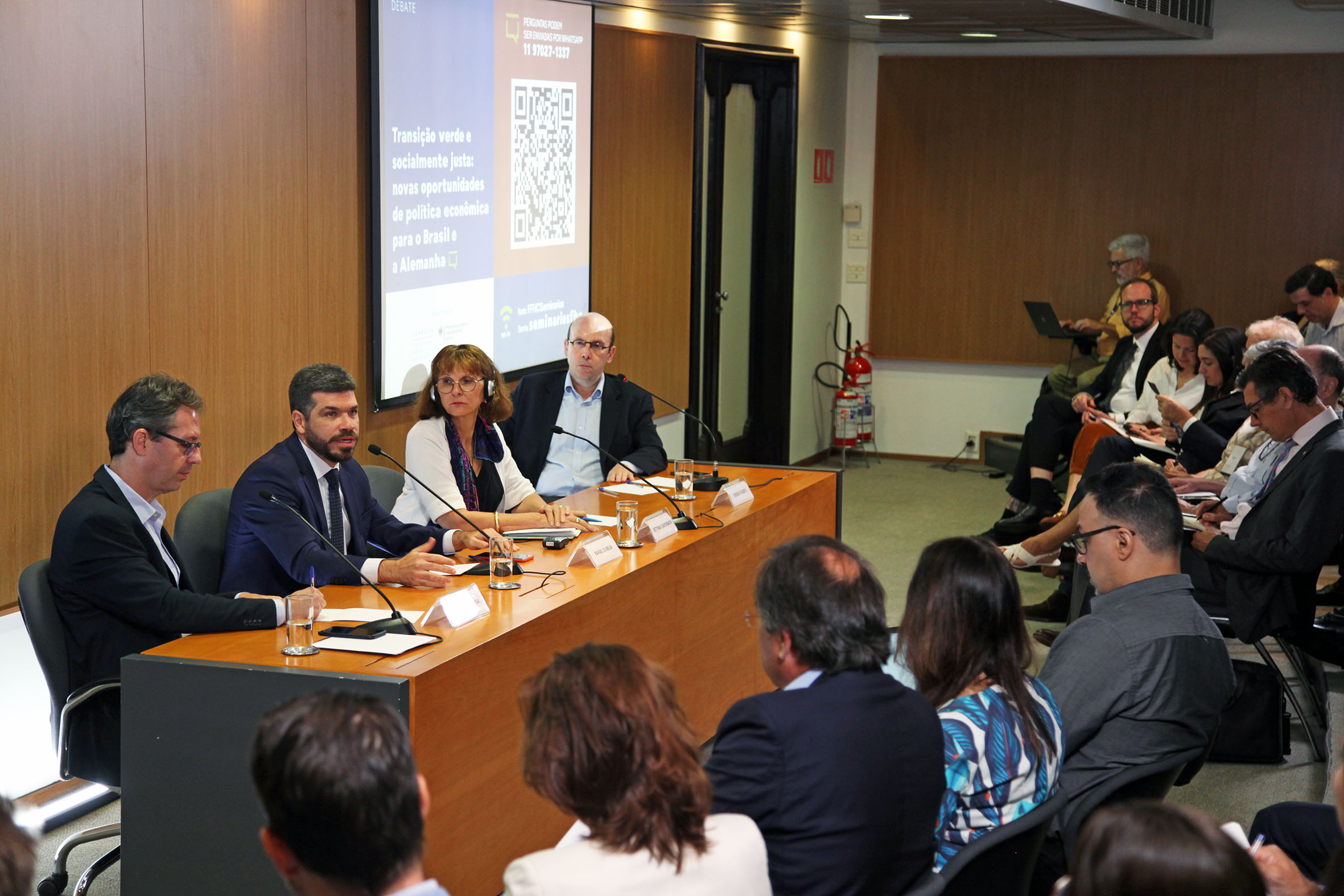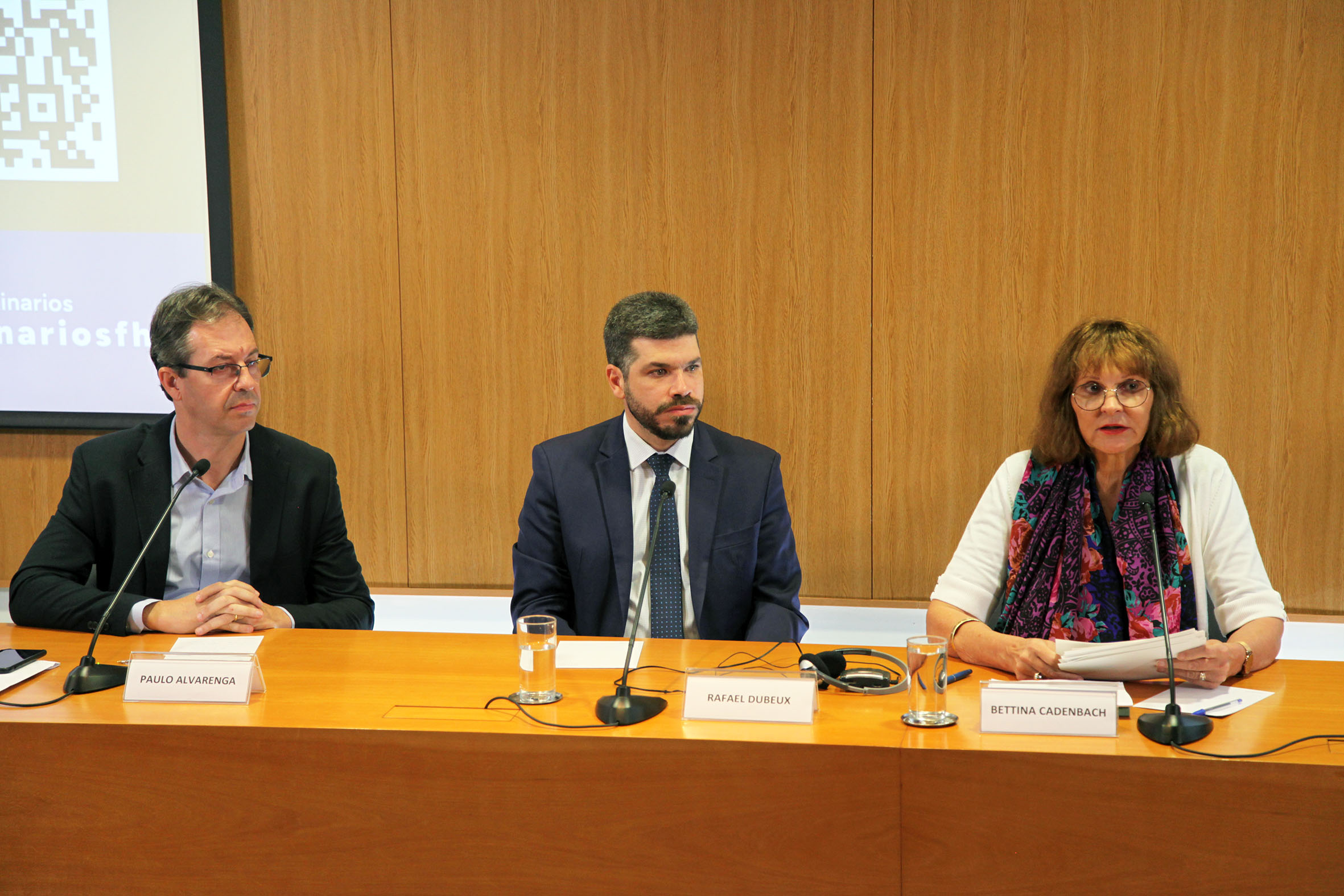A green and socially just transition: New opportunities for Brazil and Germany
The Ministry of Finance, led by Fernando Haddad, is setting the stage for the Plan for the Ecological Transformation of Brazil. This initiative, unveiled in April 2023 and currently undergoing detailed planning, follows the new fiscal framework’s approval by the Brazilian National Congress in the first half of the year and its sanctioning by the President Lula on August 31. Additionally, the tax reform is nearing its final approval stages in Brazil’s House of Representatives.
“The new fiscal framework and the tax reform are cornerstones for the Brazilian economy. We are now focusing on crafting a forward-looking agenda, establishing the groundwork for a socio-economic development model that is deeply rooted in ecological sustainability. This effort is in collaboration with various ministries, including the Environment, Agriculture, and Development, Industry, and Trade,” stated Rafael Dubeux, the special advisor to the Minister of Finance and the coordinator of the ecological plan.
In early December, during the 28th United Nations Conference on Climate Change (COP-28) in Dubai, United Arab Emirates, an event also attended by President Lula, Minister Fernando Haddad outlined that the implementation of Brazil’s Plan for Ecological Transformation would require an annual investment of between US$130 billion and US$160 billion over the next decade.
Rafael Dubeux, holding a Law degree from the Federal University of Pernambuco (UFPE) and a PhD in International Relations from IREL/UnB, presented the plan in detail at the Fundação Fernando Henrique Cardoso during a seminar. This event saw the participation of the German ambassador to Brasília, Bettina Cadenbach, and Paulo Alvarenga, chairman of the Câmara Brasil-Alemanha de São Paulo (AHK São Paulo, the Brazil-Germany Chamber of Industry and Commerce) and of Thyssenkrupp in South America. The seminar was conducted in partnership with the German Embassy on November 8th.
The speaker elaborated on a strategic plan currently under development with three core objectives:
1. To enhance the efficiency and output of Brazil’s economy through the integration of technological advancements;
2. To ensure that the benefits of increased productivity are distributed equitably across all segments of the Brazilian population, thus addressing the persistent issue of widespread low income;
3. To devise a targeted strategy for the reduction of CO2 emissions, thereby contributing to the international efforts aimed at mitigating the climate crisis.
“The challenge we are currently grappling with is how to unify these initiatives into a cohesive whole. In pursuit of this, we are in the process of crafting innovative tools and, in collaboration with Congress, enacting new legislation. This includes Bill 412, which aims to regulate the carbon market in Brazil, a measure that has successfully passed the Senate,” said Mr. Dubeux.
According to the secretary, the plan should have six pivotal strategies:
1. The development of Sustainable Finance instruments aimed at steering both public and private investments toward environmentally sustainable initiatives: This includes the introduction of green bonds and securities, alongside the formulation of the Brazilian Sustainable Taxonomy. Currently in its public consultation phase, this taxonomy is designed to set clear guidelines and standards for identifying sustainable activities, aligning Brazil with international standards akin to those of the European Union.
2. The promotion of technological enhancement within Brazil’s productive sectors to counteract the trend of deindustrialization and foster local technological development: This strategy involves leveraging public procurement to encourage innovation and allocating funds from sectors such as electricity and oil towards decarbonization projects. Additionally, the government plans to invest in the education and training of a skilled workforce, emphasizing technical education related to renewable energies.
3. The advancement of the bioeconomy in the Amazon region: Brazil’s energy matrix is largely comprised of clean, renewable energy. However, the majority of the nation’s CO2 emissions stem from deforestation and burning in the Amazon. In order to reduce forest destruction and achieve the goal of zero deforestation, the government needs to generate alternative employment and income opportunities for the Amazon’s inhabitants through the development of a bioeconomy and the implementation of payment for forest services, among other initiatives.
4. The acceleration of the energy transition: Brazil’s history of investment in hydroelectric plants and the development of ethanol has resulted in one of the world’s cleanest electricity matrices. Around 90% of the energy produced and consumed in the country comes from renewable sources, while the global average is just 25%. In recent years, the production of wind and solar energy has also grown considerably. Brazil aims to further this transition by fostering the adoption of new renewable energy sources, including green hydrogen and green diesel.
5. The stimulation of the circular economy: Brazil has considerable ground to cover in terms of material recycling, reuse, and the proper treatment of waste and sewage.
6. Adaptation to climate change: Despite global efforts to curb temperature increases in the coming decades, the effects of global warming are already manifesting in the form of droughts, storms, and other climatic phenomena. These changes disproportionately affect the most vulnerable communities, and the government intends to support these at-risk populations through initiatives such as partnerships with the Growth Acceleration Program (Programa de Aceleração do Crescimento – PAC).
“The Lula government is going to revitalize the National Climate Change Fund (Fundo Clima), established in 2009, which is poised to allocate R$10 billion towards financing sustainable development initiatives. This substantial funding, partially procured through the issuance of sustainable bonds on the international market, will be administered by the Brazilian Bank of Economic and Social Development (BNDES) in collaboration with the Ministry of the Environment and Climate Change (MMA),” said Rafael Dubeux.

Green hydrogen is the way for the country to reindustrialize and become a global power in renewable energy production
Electrical engineer and business administrator Paulo Alvarenga, CEO of Thyssenkrupp in South America, argued that the federal government and the private sector should prioritize making the large-scale production of green hydrogen viable in the country, both for export and domestic consumption. “Green hydrogen could supply up to 20% of the global energy matrix by 2050, and Brazil possesses the most favorable conditions for producing this new renewable energy source in significant volumes, positioning it to become a global leader in this promising market,” he said.
Nevertheless, the president of AHK São Paulo highlighted that the cost of producing green hydrogen is still significantly higher compared to traditional energy sources, particularly those obtained from burning hydrocarbons (oil, natural gas, etc.). This cost disparity underscores the necessity for government intervention through subsidies to propel the green hydrogen industry forward.
Mr. Dubeux referred to the government’s collaboration with Congress to outline a regulatory framework for green hydrogen, embodied in Bill 2308/2023. He stopped short of committing to a specific subsidy scheme but hinted that hydrogen projects might qualify for the Special Incentive Regime for Infrastructure Development (REIDI), especially if they foster the development of local technology.
In late November, Congressman Bacelar (PV/BA), serving as the rapporteur for PL 2308/2023, removed the proposed subsidies and incentives aimed at fostering the production of low-carbon hydrogen from the bill’s final draft, pursuant to an agreement with the economic team. The original draft from Brazil’s House of Representatives had outlined a specialized framework to provide tax exemptions for investments and reduced tariffs for renewable energy utilized in hydrogen production. The possibility of a dedicated energy auction was also under consideration; however, the economic team opted to exclude these provisions from the legislation, committing instead to conducting a financial impact assessment to determine the most viable strategies.
“In the 1980s, the government bet on the ethanol program, and the results were very positive, establishing Brazil as a global leader in this sector. In the early 2000s, it was the government’s turn to push towards wind and solar energy production, and today, we have one of the most competitive wind energy industries in the world. Today’s hot topic is green hydrogen. Although not yet cost-competitive with fossil fuels, with the right public policies, including temporary subsidies, it could significantly propel Brazil’s neo-industrialization and markedly contribute to combating global warming,” said Mr. Alvarenga.
Mr. Alvarenga also referenced the Biden administration’s 2020 announcement of a US$2 trillion investment strategy aimed at enhancing clean energy production and consumption in the United States, thereby ensuring national energy independence. The development of a green hydrogen industry in the United States is one of the pillars of this project. The European Green Deal, launched in 2019, also includes the production of green hydrogen as a priority.
“Given Brazil’s capacity to emerge as a leading producer of green hydrogen, the nation stands to attract substantial European investment aimed at cultivating this industry, thereby establishing itself as a reliable source of green hydrogen for the European market,” he said. “The window of opportunity to make a green hydrogen industry viable in Brazil is now. It’s my aspiration to witness this discourse gain prominence across the country, encompassing the public and private sectors, alongside academic institutions and research facilities,” he concluded.

Germany and Brazil must work together to defend the Amazon and in the energy transition to reduce global warming
“I don’t need to explain to anyone in Brazil the incredible opportunities the country has in the area of renewable energies. You already have a robust renewable energy matrix and a wealth of natural, mineral, and human resources to further advance this transition internally and to make a decisive contribution to the global pursuit of a sustainable future for all. Brazil and Germany, which already have a long history of partnership between both governments and companies, should join hands for this purpose,” said the German Ambassador in Brasilia, Bettina Cadenbach.
Ms. Cadenbach recalled that, especially after the pandemic and the war in Ukraine, Germany is determined to diversify its energy sources, with an emphasis on renewable energies, and green hydrogen could hold the key for forging a partnership between the governments of the two countries and German and Brazilian companies.
“There is already significant cooperation in terms of research, but now we need to resolve the legal, logistical, and infrastructure issues so that we can move forward with the large-scale production of green hydrogen in Brazil, in partnership with German companies,” said the German government representative.
Ms. Cadenbach praised the Lula administration’s commitment to protecting the Amazon and said that Germany was willing to do whatever was necessary to achieve this goal: “Brazil plays a pivotal role in preserving the Amazon Rainforest, which is essential if we are to reverse climate change. President Lula’s commitment to this cause is commendable, and Germany stands ready to support Brazil’s endeavors to achieve this goal,” she said.
In her concluding remarks, the German diplomat advocated for the swift finalization of the strategic partnership between the European Union and Mercosur: “The EU-Mercosur agreement is the means to bring together and transform our nations and corporations towards a more sustainable, equitable, and inclusive future for the people of our nations.”
Watch the lecture in full (In Portuguese).
Otávio Dias is the content editor at the Fundação FHC. He is a political and international affairs journalist, a former correspondent for Folha de São Paulo in London, and former editor of the estadao.com.br website.
Portuguese to English translation by Melissa Harkin, CT and Todd Harkin – Harkin Translations.




